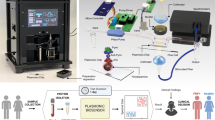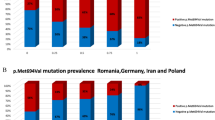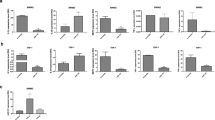Abstract
Familial mediterranean fever (FMF) is a hereditary autoinflammatory autosomal recessive disease caused by mutations in the MEFV gene. Despite the identification of many disease associated MEFV mutations, often the clinical diagnosis cannot be genetically confirmed. The currently used diagnostic sequencing techniques only allow the detection of point mutations, small deletions or duplications. The question as to whether larger genetic alterations are also involved in the pathophysiology of FMF remains to be answered. To address this question, we used multiplex ligation-dependent probe amplification (MLPA) on a total of 216 patients with FMF symptoms. This careful analysis revealed that not a single deletion/duplication could be detected in this large cohort of patients. This result suggests that single or multiexon MEFV gene copy number changes do not contribute substantially, if at all, to the MEFV mutation spectrum.
Similar content being viewed by others
Log in or create a free account to read this content
Gain free access to this article, as well as selected content from this journal and more on nature.com
or
References
The French FMF Consortium: A candidate gene for familial Mediterranean fever. Nat Genet 1997; 17: 25–31.
The International FMF Consortium: Ancient missense mutations in a new member of the RoRet gene family are likely to cause familial Mediterranean fever. Cell 1997; 90: 797–807.
Schouten JP, McElgunn CJ, Waaijer R, Zwijnenburg D, Diepvens F, Pals G : Relative quantification of 40 nucleic acid sequences by multiplex ligation-dependent probe amplification. Nucleic Acids Res 2002; 30: e57.
Hes FJ, van der Luijt RB, Janssen AL et al: Frequency of Von Hippel–Lindau germline mutations in classic and non-classic Von Hippel–Lindau disease identified by DNA sequencing, southern blot analysis and multiplex ligation-dependent probe amplification. Clin Genet 2007; 72: 122–129.
Hogervorst FB, Nederlof PM, Gille JJ et al: Large genomic deletions and duplications in the BRCA1 gene identified by a novel quantitative method. Cancer Res 2003; 63: 1449–1453.
Database of Genomic Variants. (human genome build 36). Available at http://projects.tcag.ca/variation/.
Acknowledgements
This work was supported by the Centre Hospitalo-Universitaire de Montpellier, and the French Ministry of Health.
Author information
Authors and Affiliations
Corresponding author
Rights and permissions
About this article
Cite this article
van Gijn, M., Soler, S., de la Chapelle, C. et al. Search for copy number alterations in the MEFV gene using multiplex ligation probe amplification, experience from three diagnostic centres. Eur J Hum Genet 16, 1404–1406 (2008). https://doi.org/10.1038/ejhg.2008.135
Received:
Revised:
Accepted:
Published:
Issue date:
DOI: https://doi.org/10.1038/ejhg.2008.135
Keywords
This article is cited by
-
A novel insertion mutation identified in exon 10 of the MEFV gene associated with Familial Mediterranean Fever
BMC Medical Genetics (2014)
-
Genotype–phenotype studies in a large cohort of Armenian patients with familial Mediterranean fever suggest clinical disease with heterozygous MEFV mutations
Journal of Human Genetics (2010)



